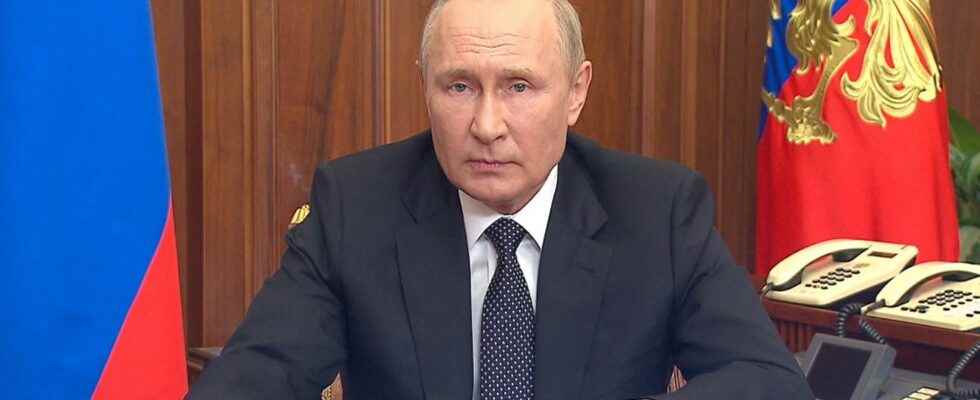Russian President Vladimir Putin on Wednesday mobilized hundreds of thousands of reservists to relaunch his offensive in Ukraine and brandished the threat of the use of nuclear weapons, on the 210th day of the Russian invasion of the country. In an address to the nation, Vladimir Putin said he was ready to use “all means” in his arsenal against the West, which he accused of wanting to “destroy” Russia. “It’s not a bluff,” he assured.
Information to remember:
– Putin mobilizes 300,000 reservists and brandishes the use of nuclear weapons
– Macron calls on the world to put pressure on Putin
– Zelensky “does not believe” in the use of nuclear weapons
Macron calls on the world to put pressure on Putin
Emmanuel Macron on Wednesday called on the international community to “put maximum pressure” on Russian President Vladimir Putin.
The decisions of Vladimir Putin, who also announced the mobilization of reservists, “lead to further isolate Russia”, added the French president on the sidelines of the UN General Assembly in New York, welcoming recent statements from China and India who called for an end to the war in Ukraine.
International reactions to Putin’s speech
After the Russian president’s speech, the White House immediately denounced “irresponsible rhetoric from a nuclear power”, indicating that it took this threat “seriously”. China, courted by Russia, seemed to distance itself by calling for a ceasefire and respect for the territorial integrity of states, a reference to the Russian annexation project of part of Ukraine.
A new escalation in the conflict
The mobilization of reservists has been described in Europe as an “admission of weakness” by Moscow, whose army has suffered setbacks in recent weeks against Ukrainian forces. It marks in any case a new escalation of the conflict, the day after the announcement by Russia of “referendums” aimed at annexing four regions of eastern and southern Ukraine partly controlled by Moscow. Taking care not to announce a general mobilization, feared by millions of Russians, Vladimir Putin decreed a “partial” measure on Wednesday, deemed “urgent and necessary”.
According to Russian Defense Minister Sergei Shoigu, 300,000 reservists are initially affected. Sign of the concern of many Russians, airline sites were stormed after Vladimir Putin’s speech and an online petition against the mobilization collected more than 230,000 signatures. Imprisoned Kremlin opponent Alexei Navalny criticized the measure, saying it would lead to “a huge tragedy”.
Zelensky “does not believe” in the use of nuclear weapons
In an interview with the German channel Bild TV, Ukrainian President Volodymyr Zelensky said he “did not believe” in the use of nuclear weapons by Moscow. “I don’t believe the world will let it happen,” he added. NATO Secretary General Jens Stoltenberg denounced Vladimir Putin’s “dangerous nuclear rhetoric”, adding that the Atlantic alliance would continue to “support Ukraine”.
With his speech on Wednesday, the master of the Kremlin also took a new step in his speech against the West, accusing it of wanting to “divide and destroy” Russia by arming Ukraine and of subjecting Moscow to “nuclear blackmail”. . Its Minister of Defense, Sergei Shoigu, bluntly affirmed that Russia was not fighting “Ukraine so much as the West”.
Russian forces in retreat
Faced with the breathlessness of his offensive in Ukraine, which is soon entering its eighth month, Vladimir Putin is trying to raise the bar. Its forces have indeed been forced to retreat in recent weeks in the face of Ukrainian counter-offensives in the regions of Kharkiv (northeast) and Kherson (south), arousing amazement in Moscow.
If the impact of a partial mobilization should not change the situation in the immediate future, this measure marks a break with the approach of the Kremlin which has striven so far to protect the Russian population from the fallout from the conflict. Several Western capitals considered that this measure was an “admission of failure”. It shows the “disarray” of Vladimir Putin, estimated the head of European diplomacy, Josep Borrell. Even China, which Moscow is trying to get closer to, called for a “ceasefire” and respect for “the territorial integrity of all countries”, the day after the announcement of the annexation “referendums” by Moscow.
Upcoming referendums in the occupied areas
Because even before the partial mobilization, the announcement Tuesday of “referendums” of annexation in the regions controlled by Moscow in Ukraine, from September 23 to 27, had signaled a hardening. Russian military doctrine provides for the possibility of resorting to nuclear strikes if territories considered Russian by Moscow are attacked, which could be the case with annexed areas.
These elections will take place in the regions of Donetsk and Lugansk, which form the Donbass (east), as well as in the occupied areas of Kherson and Zaporizhia, in the south. These votes were criticized by kyiv and its Western allies, who described them as “simulacra” of ballots without legal value.
A new Russian bombardment in Zaporijjia, denounces Ukraine
On the ground, the mobilization could announce an increase in violence at the dawn of the beginning of the eighth month of conflict. Ukrainian authorities have accused Russia of again bombing the site of the Zaporizhia power plant (southern Ukraine), the largest in Europe, on Wednesday.
In Kharkiv (northeast), Ukraine’s second city near the Russian border, Svetlana, 63, urges the Russians to ignore the mobilization order and “finally wake up”. Around her, residents are clearing the debris of a building hit during the night by a missile. Galina, a 50-year-old neighbor, gets angry with the Russians who say they want to “liberate” her. “What do you want to free us from?” she asks. “From our homes? From our relatives? From our friends?”
